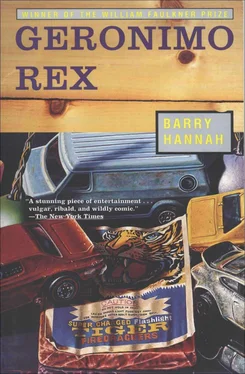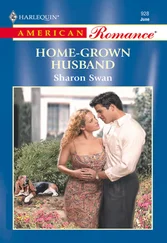“Wait. Just wait a bit.” I heard, or felt, the shudder of a certain drum corps putting into action a hundred yards away. “Wait for the big green band.”
“Who is that?” he asked me. “That’s him , that’s who it is! And that girl.” I looked, and right across the street, on the corner, was Catherine. She had seen me and was waving timidly now. Uncle Peter stood by her. He was squinting and lifting himself up on his toes, with the cane rammed behind him on the sidewalk. I felt disarmed without my cosmetic spectacles, but I had my beard as usual.
“Yeah, I know him. I know you, old snake. He’s looking at us, Monroe. I wonder if that cockhead remembers me. Fil drop something on your head, buddy!” Silas shouted across the street at him. Luckily, for me, a band was close on us and the shout was unavailing; as the band passed I jerked Silas back.
“Shut up, shut up!”
“He better watch it. I’ll crown him. I’ll lay some kind of dent in that buckaroo hat for him.”
The next band was Harley’s. I nodded wisely.
“Gawdamighty! Tremendous!” yelled Silas.
The yokels along the street cringed back a bit and looked askance lonesomely. This thrilled Silas. He threw out his arms and greeted the band with his outstretched chest. I didn’t recognize what the band was playing, at first. It was somehow, in a clashing, agonizing way, Moorish and Christian both: medieval feast music. Then I knew it was “Charlemagne”—gloomy in its brass, in minor key, harsh and radiant in its woodwinds, with a crowning tinkle of bell lyres at the top, all of it lifted up by a whirlpool of bass, trombone, and drum muscle. Then I picked out an odd sound: tambourines. I kept listening for the Sousa. It wasn’t there.
“Magnificent!” shouted Silas, as we began walking. He was right. In front, on the other side, strode the principal in the white uniform and helmet. Now this man could walk . Was he smug and imperial.
“That Ethiopian’s having fun, ain’t he?” This was Harley talking to me. He was walking along too. Some ways in back of him were his wife and boys, walking too, but slower. The baby boy was toddling vigorously, with an apple in his hand. The band cut off with a grand weird chord. The drummers rolled like an engine that had cranked up underground and was going to drive off with the whole city.
“That ‘Charlemagne’ is really a horse. That’s the best thing I ever heard on the march,” I told Harley.
“I’ve made a hundred and five dollars on it. It’s the best thing I ever heard, too. And to this date, that’s how much … uh oh! Lookit there.” We’d gotten out some twenty feet in front of the band. There were Peter, Catherine, and a skinny man with a potbelly in a white shirt, tie, plastic penholder at the pocket. A clerkish greaser, he was. They were all walking parallel with us on the other side of Capitol Street. Peter had his eye on the man in a white uniform. We were getting into a thicker crowd of Negroes on the sidewalks now. Peter touched his cane to the backs of people to get a clean view, moving them aside, thrusting his head and wide hat over the curb.
Harley got a pert, scandal-bent look on his face. “You don’t reckon he’ll use that stick on our principal?”
“I’d be surprised. He—” At that time, Peter reached the cane out and tapped the principal on the arm. Just tapped him, just a flick of cane, so as to make the man look his way. The principal didn’t notice, though. He was blowing the whistle and nodding to the drum major as he made inept directing motions with his arms, wanting the band to play. At last the drum major understood and the band was into an intimidating new march.
Silas rushed up to me, really furious, throwing his arms up and down. “Did that son of a bitch hit him? Did you see?!” I didn’t see Silas run back up the sidewalk and borrow the apple from Harley’s baby. Next thing I knew he was in front of us at the curb, making his way through the Negroes. We were at the intersection of Farrish Street, and there seemed to be hundreds of tall men in hepcat clothes around us.
“Don’t let him do that,’ Harley said in my ear. He had a firm grip on my arm. The Negroes were backing away from Silas, who was walking in the gutter. When I reached him and looked across the street, of course it was Peter, his niece, and the other man, walking ahead of the band too, Peter studying the man in white. Silas threw the apple at him with everything he had, and it was rising when it got to him. The apple missed Peter but struck Catherine directly in the face and flew to pieces. A scream went up. I caught a view of her down on her knees, holding her face, just as the band came between. Silas turned toward me, hands on his hips, eyes down. We, Silas and I, passed Harley and his family on the sidewalk. Harley would not look at Silas. He was gesturing in anger to his wife. Then we passed them. I saw two policemen running down the sidewalk on the other side, toward Peter’s vicinity. There was commotion over there. The last rank of the band went by and I saw the enormous hat waving back and forth, and heard, even over the band, a man screeching. Then an arm went up, pointing to the Negroes across the street from it. The potbellied thin man ran across the street in front of a float. Then came a cop waddling after him. Whoever the man in the white shirt was, he drove into a group of tall hepcats, and they gave for a second. Then the cop drew up, and suddenly jumped to one side. Somebody in the crowd had laid one on the fierce boy and he was hurtling out in the parade like somebody trying to lift off and fly by running backwards. He fell flat out under another float — snowy-looking flannel hanging all over it — and the rear wheel of the float rolled over him. It was only a flat-bed trailer being towed behind a car, but there were several Negro girls in evening dresses sitting on it, and my stomach sank when I saw one side of the flat lift up and unseat a couple of the girls. The cop went back out in the street toward the, well, at least, outraged form. The big Santa Claus float rolled down and obscured my view.
“You got to go back down and—” I turned to Silas. He was gone. He hadn’t seen any of this. I walked back up to Wright’s.
“Hero,” I said to him.
“You know damn well I wasn’t throwing at the girl.”
“You left a lot of innocent people standing around back there.”
“You wanted me to hang around and be arrested? I told you about that son of a bitch and what I saw him doing. I’m fed up with the people in this state like that walking around free. He hit the man with that cane, didn’t he? Tell me, did he hit him?”
“No. He touched him with it.”
“Touched him? Well what kind of touch was that? You want people touching you with a fucking stick?” Then he went on, reviewing me again on what he’d seen Peter doing at Oxford during the Ole Miss riots over James Meredith; the night Kennedy made his appeal to Mississippi on television, the night they set cars on fire and students attacked the Lyceum Building, where they had the FBI hemmed in; the night the tear gas flew and one student would have driven a bulldozer against the door of the Lyceum except he ran out of gas; the night a jukebox-supplier and a Canadian journalist were murdered by unknown snipers; when the local reporter said FBI men had attacked a girls’ dorm with tear-gas guns, when the Mississippi Highway Patrol was indignant; when General Edwin Walker was alleged to have led a crowd of student quasi-lancers against the FBI; the night Silas missed, driving into town in the early morning of the next day, seeing something curious on an overpass of the railroad between the town and the campus. Parked his car and walked up there. He walked up to the scene of a group of busy adolescents with a grown man ordering them around. Some of them were scouting the traffic and others were moving crossties toward the rail. It was still gray and foggy. “Here’s one!” one of the kids yelled. The older man clapped his hands and directed them to get the crosstie on the rail. “Be ready!” he said. It was Colonel Lepoyster, using his hat that way, sleepless, as at Cold Harbor or some other perimeter above Richmond, 1864, reduced to boys and no ammunition. Coming under the bridge was an olive truck with canvas over the trailer. The boys dropped the crosstie over the rail and the huge beam fell on the trailer. Then the other group dropped another crosstie on the windshield of the truck as it emerged. The crosstie hit end down and plunged into the cab as if into water. The truck roared across the wrong lane of the road and smacked into a telephone pole. The pole broke and fell back on the canvas, full of wires. The truck rolled over on its side. There was a cheer on the rails. A man with a star on his helmet put his head up out of the cab window. The soldiers who weren’t hurt were angry, and squirmed out the back. Colonel Lepoyster told the teenagers to run, and they did, down the railroad in both directions and off into the high weeds. The man in the starred helmet had a.45 in his hand but was still dizzy.
Читать дальше












